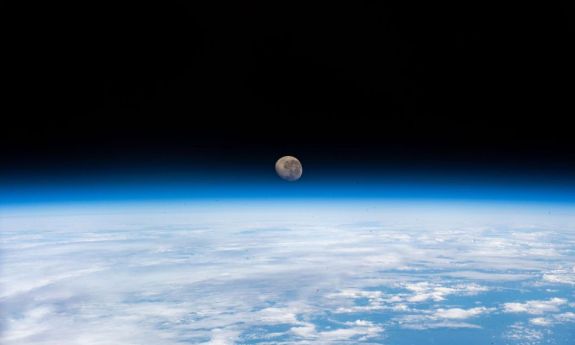Tensions on Earth Don’t Have to Affect Outer Space Diplomacy
Webinar offers recommendations on avoiding conflict in space

But space diplomacy is more complicated today than during the Cold War. There’s the rapid and transformational development of space technologies available to more nations and private interests than ever, a commercial space revolution and a resurgence of geopolitical rivalries, said Space Diplomacy Lab co-founder Benjamin L. Schmitt, a senior fellow at the University of Pennsylvania’s Department of Physics and Astronomy, and the Kleinman Center for Energy Policy.
Russia’s invasion of Ukraine is also affecting the future of space cooperation.
“One of the major events that's ushering in this new space age is a war with Ukraine,” said lab member Lyndsey Gray, an American Association for the Advancement of Science (AAAS) Science, Technology and Policy fellow in the U.S. Department of State. “How are we going to frame these rules so this war does not act as an overbearing presence that essentially spoils the environment of cooperation and diplomacy? Is that even possible?”
Hence the mission of the Space Diplomacy Lab, which Duke launched in early 2022. The lab provides a forum for a multidisciplinary set of academics, students, diplomats, reporters and commercial spaceflight leaders to develop research, policy proposals and solutions to mitigate risks and ensure “a secure and sustainable future of humanity in space.”
Some of the questions considered during the June 29 webinar included avoiding a weaponization of outer space, the roles of China and Russia, and setting safe and sustainable norms between governments and the private sector to operate spacecraft in the low earth orbit.
“There's something inherent about space that I actually think allows cooperation more easily than other things on Earth, just because there is this sort of sense of the unknown and what can be discovered through that.”
Benjamin J. Schmitt
“When we are thinking about anticipatory diplomacy, we're trying to look as far forward as we can, being realistic,” said Duke Rethinking Diplomacy Fellow W. Robert Pearson, a former U.S. ambassador to Turkey. “We're not writing science fiction here, but to see what crises could become of current problems and try to anticipate some of those solutions. We are in great partnership with science.”
Davis Cross said there is potential for diplomats to focus on anticipatory diplomacy -- to forecast where the needs are, then capitalize on space diplomacy to shape it into a new space age rather than a space race.
It is not an easy task, she said, noting that in spite of decades spent trying to update the Outer Space Treaty of 1967, efforts have largely failed.
“In my most recent research, some of the most successful multinational agreements come from diplomats and others spearheading very forward-looking ideas. You don't achieve them necessarily overnight, but by putting them on the table, more becomes possible. This is how the International Space Station came to be,” said Davis Cross, who is also the Dean’s Professor of Political Science, International Affairs and Diplomacy at Northeastern.
Space policy is more fragmented today than when “universal” treaties were designed for all countries, said Duke professor and lab co-founder Giovanni Zanalda, director of the Rethinking Diplomacy Program. (He will teach a new course on space economics this fall.)
“It reflects more and more geopolitical tensions, and this is creating a different type of” diplomatic approach to traditional treaties and agreements, he said.
The Artemis Accords, a non-binding set of principles designed to guide civil space exploration and use in the 21st century, is a good example of an agreement that brings nations together with a common vision for peaceful, sustainable and transparent cooperation in space, Zanalda said. Started by eight signatories in October 2020, it now has 27.
Developing norms for space activity is also beneficial to the private sector, said lab member Gray, noting that the space economy is estimated to be worth more than a trillion dollars by 2040.
Despite the challenges, Schmitt and fellow lab partners are optimistic.
“There's something inherent about space that I actually think allows cooperation more easily than other things on Earth,” he said, “just because there is this sort of sense of the unknown and what can be discovered through that.”
This event is part of Duke’s Rethinking Diplomacy Program’s Space Diplomacy Lab Webinar Series. The Rethinking Diplomacy Program, hosted at the Sanford School of Public Policy, is supported by a grant from the Josiah Charles Trent Memorial Foundation Endowment Fund.